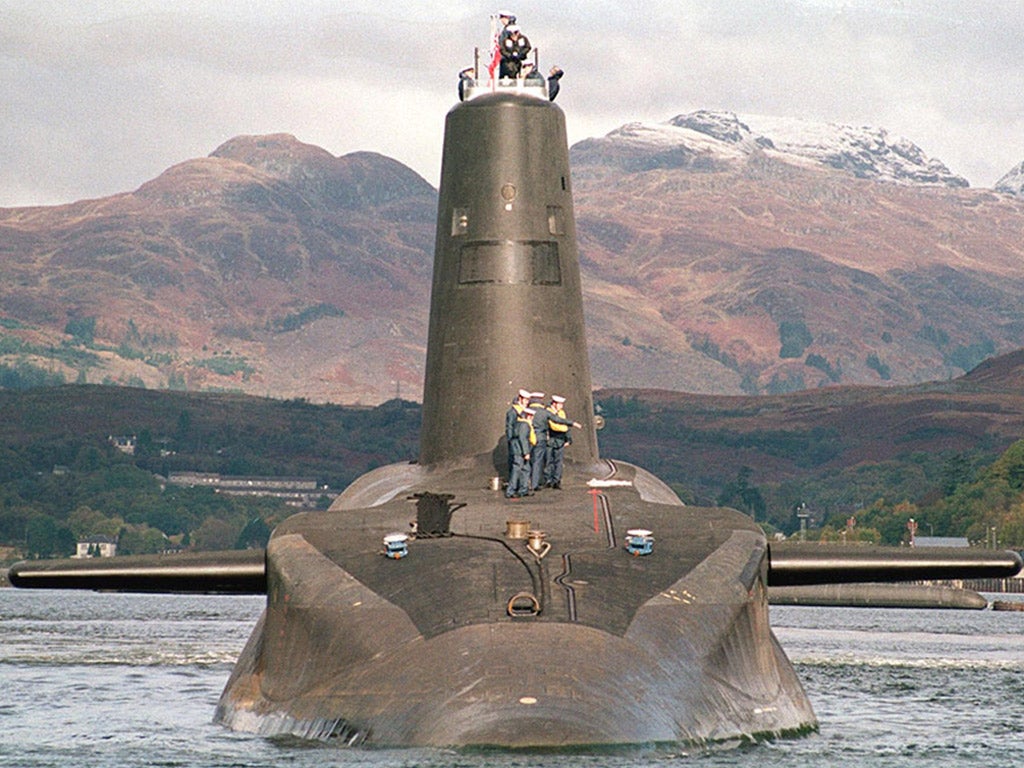Lib Dems push for 'stand-by' Trident replacement deal
Party leaders say proposal not to replace Vanguard subs would save billions and set them apart from the Tories

Your support helps us to tell the story
From reproductive rights to climate change to Big Tech, The Independent is on the ground when the story is developing. Whether it's investigating the financials of Elon Musk's pro-Trump PAC or producing our latest documentary, 'The A Word', which shines a light on the American women fighting for reproductive rights, we know how important it is to parse out the facts from the messaging.
At such a critical moment in US history, we need reporters on the ground. Your donation allows us to keep sending journalists to speak to both sides of the story.
The Independent is trusted by Americans across the entire political spectrum. And unlike many other quality news outlets, we choose not to lock Americans out of our reporting and analysis with paywalls. We believe quality journalism should be available to everyone, paid for by those who can afford it.
Your support makes all the difference.The future of Britain's nuclear deterrent looks likely to be an issue at the 2015 election as the Liberal Democrats prepare to endorse a scaled-down version of the £25bn programme to replace the Trident system.
An internal review by the Ministry of Defence is expected to produce a "menu of options" including putting the UK's nuclear weapons on "standby" so they could be reactivated at short notice.
The warheads would be launched with Cruise missiles from the existing Astute class submarines, with the two elements kept at separate locations. This would save billions of pounds as the Government would not need to replace the four Vanguard submarines, one of which is continuously at sea.
Supporters think an Astute submarine with nuclear weapons could be deployed within a week if there were a build-up of international tension. Some defence experts believe more time could be needed and that the Astute subs might need to move much nearer their target than the Vanguards, which have a range of 6,000 miles.
The MoD review is due to conclude by the end of this year and, while some details will be kept secret, a summary is likely to be published early next year. The "standby" option is winning growing support among Liberal Democrats and is expected to feature in their 2015 election manifesto if it is given the go-ahead by the MoD study.
The move would allow the Liberal Democrats to fight the election on a platform distinct from that of the Conservatives, who remain strongly committed to providing a "like-for-like replacement" for Trident by 2028, a process begun by the previous Labour Government. The Conservatives would almost certainly portray the "standby" plan as too risky in an uncertain and dangerous world and argue that the UK must remain a full member of the nuclear club to maintain a credible deterrent.
Although contracts worth £1.3bn for the new Trident system have been announced recently, the Coalition parties have agreed to differ on the issue and have put off the final decision on the UK's deterrent until 2016.
Nick Clegg's party, which is keen to "differentiate" from the Conservatives in the run-up to the election, could seize on the scaled-down Trident option as a way of winning back progressive voters who have deserted the Liberal Democrats since they joined the Tories in coalition.
One Liberal Democrat source said yesterday: "We have to ask whether we can afford a Cold War weapons system in the age of austerity. Being a 'threshold' nuclear power would save billions. Other countries would know we still had a nuclear capability."
Labour supports an independent deterrent but has suggested making savings on the Trident replacement programme. But Ed Miliband said on becoming Labour leader that the party would "need to look very carefully at whether renewing Trident is the necessary or the right thing to do".
The MoD review will report to Philip Hammond, the Defence Secretary, and Nick Harvey, the Liberal Democrat Armed Forces minister, who is keen to explore alternatives to the £25bn Trident programme.
Tory ministers had hoped the exercise would build support for a "like-for-like" replacement but that now appears unlikely. Senior Liberal Democrats including Sir Menzies Campbell, the party's former leader, have questioned the value of the existing "Moscow criterion" – keeping an independent deterrent capable of obliterating the capital of Russia – in the post Cold War era.
Even some senior defence officials and retired service chiefs believe Trident is a relic and would rather see part of the £25bn budget spent on the conventional weapons needed for today's conflicts.
Nuclear weapons: The alternatives
1. "Like for like" replacement of existing submarine-launched Trident from 2028 at a cost of £25bn. Favoured by Conservatives and, for now, by Labour.
2. Scaled down version of Trident with warheads launched with Cruise missiles from Astute class submarines. Much cheaper. Likely to feature in 2015 Lib Dem manifesto.
3. Air-launched nuclear deterrent. Was considered by previous Labour Government. Critics say it would be expensive to build a new fleet.
4. Scrapping the nuclear deterrent. Favoured by CND, the SNP and the Green Party.
Join our commenting forum
Join thought-provoking conversations, follow other Independent readers and see their replies
Comments